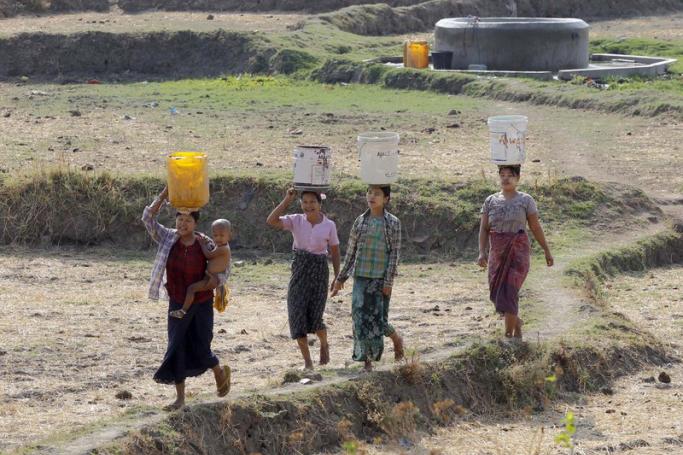As the Myanmar November 2020 elections bestowed a renewed and larger mandate for the National League for Democracy (NLD) to govern the country, issues of environmental conservation and climate change adaptation are expected to receive specific attention in its second term.
In the run up to the 2020 elections, political parties, including NLD pledged to address some of the pressing issues and work towards mitigating the adverse impacts of environmental degradation and climate induced disasters. Especially parties from ethnic states have shown greater concern on issues of land, forests and environmental management.
Myanmar’s sustainable development plan gives emphasis on protecting the environment. Sustainable use of land, forest and marine resources would boost the economic development as well as employment. Over the past four years the government has put in place institutional mechanisms and has developed an action plan for climate change mitigation. This is one area that has received significant appreciation and at the same time remains an agenda of contestation as Myanmar’s major environment issues are related to natural resource exploitation.
UN agencies and development partners have facilitated processes for climate change policies, strategies and action plans and supported adaptation and in identification of solutions. However, contentious issues still remain on the table which seek political solutions, accommodating views of all concerned.
The post COVID-19 economic recovery also puts significant strain on the public policy in terms of balancing environmental concerns with that of economic growth. Challenges of infrastructure development, power and energy investments, mining and forest resource use would call for climate friendly investments, green technologies and resilience of the communities that are going to be affected. Resolution of issues of climate change and environment defines the development pathway that the country is going to adopt and they do not warrant any partisan approach rather they have to accommodate the long term sustainability and resilience of communities. A consensual approach to environment and climate change is required for Myanmar to move forward and meet the SDGs.
It is in this context, how the political parties articulated issues of environment and climate change in their manifestos and party pledges before the electorate during the 2020 elections assumes significance. An analysis carried out by an environmental think-tank ALARM on the positions of political parties on the environment is first of its kind that explains the seriousness and resolve of political parties. It can form a basis for building consensus on some of the issues like investment decisions that factor in environmental and climate change impact on communities.
ALARM’s analysis covering 15 political parties, of them 10 being ethnic parties, points out that a majority of them have expressed commitments on preserving and protecting the environment and sought to address issues of land and climate change. It is interesting to note that for a significant majority of political parties, agriculture development, governance
of mineral resources and land issues formed part of their political pledge before the electorate. Emerging climate change crisis in terms of scarcity of water resources, transportation and pollution problems have been identified as issues by few political parties. While there are environmental issues that warrant a national level response, there are state specific issues, especially in relation to land and natural resource governance that were sought to be addressed by the ethnic political parties. Broader and national environmental issues such as resource disputes, decline in agricultural production, increasing natural disasters, energy shortages, increasing polluting industrial projects in industrial zones, and deforestation were also mentioned by 50 per cent of the political parties.
An enumeration of environmental issues identified by the ethnic political parties indicate that they are varied and diverse, and communities are concerned with about 28 issues that affect their lives. Unsustainable logging, fishing, oil and gas, and mining activities, unsustainable large scale plantations (banana cultivation, oil palm, rubber), natural disasters like floods and landslides, land disputes and confiscation, and polluting industries formed important issues raised by ethnic parties across the states of the country. It is interesting to note that some of the national parties like the NLD are also conscious of these issues and sought to address them.
A striking feature according to the ALARM study on electoral pledges is that most political parties have expressed their commitment to address the issues in generic terms. This necessitates the need for deeper understanding of issues for identification of solutions that work for many, especially the affected communities. Some of the other issues highlighted by political parties include transparent and accountable governance of environment, fair division of power and authority for states/regions to address environment management and inter-generational justice in environmental governance. Respect for customary laws that govern land and environment, and adoption of green technologies and renewable energy sources, green urban spaces, waste management also figured as aspirations of the political parties to build a sustainable future.
Given that Myanmar’s trajectory of development is heavily dependent on natural resource extraction, sustainable and responsible practices are critical in order to balance the economic growth with environmental conservation.
Views of all political parties and their commitments would give the right signal for the policy makers in addressing the issues and build consensus in finding solutions. Accommodating the voices of all stakeholders becomes essential and expression of political parties can be seen as a first step in that direction. It is contingent upon the upcoming government led by the NLD to take on board views expressed by ethnic parties and other national parties in addressing environmental and climate change issues to the satisfaction of all stakeholders. A closer citizen engagement and monitoring is also necessary in order to ensure that the commitments made by the parties are translated into reality.
(Views expressed are personal)












